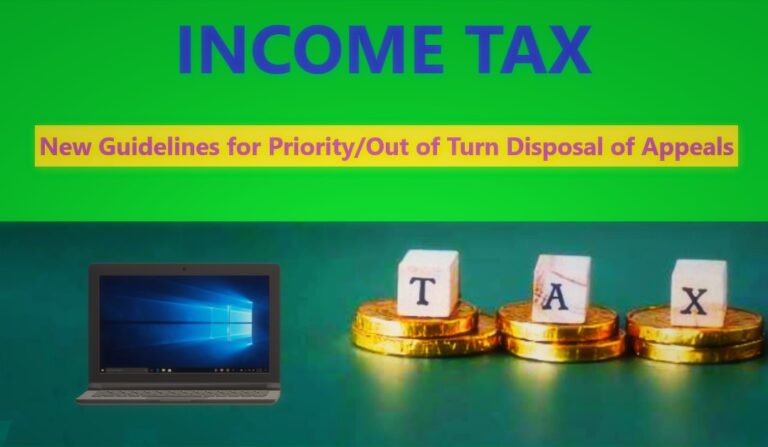While the 2021 guidelines had listed five situations, the new guidelines have retained four of those, with the addition of replacing the condition related to refunds of ₹1 lakh.
The Income Tax Department has introduced fresh guidelines aimed at priority or out of turn disposal of pending appeals at the level of Commissioners of the Income Tax (Appeal/Appeal Unit) and Additional/Joint Commissioner of Income Tax (Appeal). These new guidelines will replace the previous 2021 mechanism.
Outlined below are the five situations identified for priority or out-of-turn disposal:
(i) Cases with a demand exceeding ₹1 crore,
(ii) Appeals accompanied by VIP/PMO references for swift resolution,
(iii) Requests submitted by senior citizens,
(iv) Requests made by super senior citizens,
(v) Any other case presenting genuine hardship.
While the 2021 guidelines had listed five situations, the new guidelines have retained four of those, with the addition of replacing the condition related to refunds of ₹1 lakh.
The guidelines specify that requests for such expedited appeals, addressing genuine and exceptional circumstances, either raised directly by the appellant or referred by the Assessing Officer/Range head, will be considered by the Principal Commissioner, Chief Commissioners, or Director General of Income Tax. The recommendations are to be forwarded by the Jurisdictional Principal Commissioner of Income Tax. For appeals under the purview of the faceless Commissioner, they will be referred to the Principal Chief Commissioner.
The resolution of appeals has been a significant focus, considering the substantial amounts of money involved in cases pending before the Commissioner of Income Tax (Appeal). For instance, the Finance Ministry informed the Lok Sabha last year that over ₹14 lakh crore was locked up in appeals by the end of the Fiscal Year 2021-22. Similarly, the Central Action Plan for FY24 highlighted that while the number of closed appeals at the end of FY23 was over 5.16 lakh, the approximate pending appeals from before April 1, 2020, as of March 31, 2023, stood at over 2.82 lakh.
The appeal mechanism allows taxpayers to challenge assessment orders if they disagree with the tax demand raised by the tax officer. The first level of appeal, the CIT(A), who is also an Income Tax Department official, is available. If the CIT(A) ruling is unfavourable to the taxpayer, they may then appeal to the second level of appellate authority, the Income Tax Appellate Tribunal (ITAT). Subsequently, higher appeals can be made to the high court and ultimately to the Supreme Court.
In a bid to streamline and enhance the efficiency of the appeal process at the initial level, the government introduced the concept of Faceless Appeal in 2020, which was further refined and updated in the subsequent year. Under the oversight of the National Faceless Appeal Centre (NFAC), the faceless appeal system, comprising 285 CIT(Appeal) Units across the country, eliminates the need for the physical presence of the appellant.
The Income Tax Department has also set annual disposal targets. For instance, each Commissioner of Income Tax (Appeal/Appeal Unit) assigned to Central and faceless appeal duties is expected to resolve a minimum of 450 appeals (excluding Vivad Se Viswas Scheme or VSVS orders) for the financial year 2023-24. Similarly, each CIT(A) overseeing IT (International Taxation and Transfer Pricing) appeal matters is expected to dispose of a minimum of 350 appeals (excluding VSVS orders) for the financial year 2023-24.
Stay informed and compliant with the latest guidelines from the Income Tax Department for a smoother tax appeal process.
Download the Official Notification
To Access the CBDT Notification 28/2024 Dated 8 March 2024 CLICK HERE
Read More
CBDT Circular 4/2024: Extension of Due Date for Filing Form 26QE by Specified Persons
CBDT Notification 27/2024: Changes in Form 3CD, Form 3CEB & Form 65
